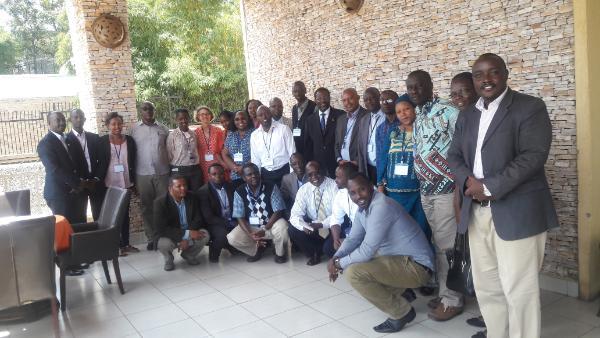Project in Rwanda
Enhancing Milk Quality and Consumption for Improved Income and Nutrition in Rwanda
Timeframe: January 2017 - September 2020
Funding: USAID
Affiliate project: Engaging Men in Supporting Maternal and Child Consumption of Milk and other Animal-Source Foods in Rwanda
Principal investigator (PI) and lead institution
Emily Ouma, International Livestock Research Institute (ILRI)
Co-PI and collaborator institutions
- Valerie Flax, RTI International (and University of North Carolina)
- University of Rwanda
- TechnoServe
Results & Updates
Journal Articles
- Flax, V.L., Ouma, E., Izerimana, L., Schreiner, M., Brower, A.O., Niyonzima, E., Nyilimana, C., Ufitinema, A. and Uwineza, A. 2021. Animal source food social and behavior change communication intervention among Girinka livestock transfer beneficiaries in Rwanda: a cluster randomized evaluation. Glob Health Sci Pract. 2021;9(3). https://doi.org/10.9745/GHSP-D-21-00082
- Habiyaremye, N., Mtimet, N., Ouma, E.A., and Obare, A.G. 2023. Cooperative membership effects on farmers’ choice of milk marketing channels in Rwanda. Food Policy, Volume 118, 2023, 102499. https://doi.org/10.1016/j.foodpol.2023.102499
- Habiyaremye, N., Ouma, E.A., Mtimet, N. and Obare, G.A. 2021. A Review of the Evolution of Dairy Policies and Regulations in Rwanda and Its Implications on Inputs and Services Delivery. Frontiers in Veterinary Science, 8:611298. https://doi.org/10.3389/fvets.2021.611298
-
Outcome Story, December 2021: Milk and animal source foods can help turn the tide on malnutrition for children in Rwanda. CGIAR Research Program on Livestock.
- Case Study, June 2020: Case Study of an In-Kind Performance Support System for Dairy Producer Organizations in Rwanda
- Technical note: Performance of Dairy Cooperatives in Rwanda: Outcomes of Selected Capacity Development Interventions
- September 2019 update: Rwandan Government Livestock Asset Transfer Program (“Girinka”) is Associated with Improved Child Nutrition
- Poster 2019: Does the Girinka Program Improve the Nutrition of Young Children and Can the Impact Be Increased Through Social Behavior Change Communication?
- Summary 2019: Innovation Summary for Social & Behavior Change Communication
- Blog post 2019: Research helps parents “give milk” to improve nutrition and livelihoods in Rwanda
Project Plan
 Increasing the quality, marketing, and consumption of ASF, including milk, is an important research for development priority for Rwanda. Rwanda’s dairy industry is recognized by the GoR as a strategic sector that can improve incomes and nutrition of poor households. The aim of the project was to contribute to efforts aimed at enhancing the quality and consumption of milk for improved income and nutrition in Rwanda. The proposed project draws upon the work and lessons of a previous GoR program, the One Cow per Poor Family (Girinka) program, and an ongoing USAID Feed the Future funded program - Rwanda Dairy Competitiveness Program (RDCP II).
Increasing the quality, marketing, and consumption of ASF, including milk, is an important research for development priority for Rwanda. Rwanda’s dairy industry is recognized by the GoR as a strategic sector that can improve incomes and nutrition of poor households. The aim of the project was to contribute to efforts aimed at enhancing the quality and consumption of milk for improved income and nutrition in Rwanda. The proposed project draws upon the work and lessons of a previous GoR program, the One Cow per Poor Family (Girinka) program, and an ongoing USAID Feed the Future funded program - Rwanda Dairy Competitiveness Program (RDCP II).
Specific research objectives include the following:
- Evaluate the impact of a nutrition education intervention on ASF consumption and nutrition outcomes among children 6-23 months of age and pregnant and lactating women: The overall purpose is to determine whether participation in the Girinka program alone or Girinka participation plus targeted nutrition education is more effective at improving maternal and child ASF consumption and nutrition outcomes. The intervention will educate project participants on the importance of nutrition, including through behavior change messaging on ASF, especially milk. This intervention will be evaluated using a cluster-randomized design.
- Assess and enhance the performance and capacity of dairy cooperatives to improve market access for smallholder milk producers: Various challenges affect function of the cooperatives, including poor management, lack of training, lack of refrigeration, and pest control. This project will assess performance gaps of the cooperatives in aspects of governance, gender, leadership, and business management. Based on the results, a gender-sensitive capacity development response plan will be drawn, implemented, and its impacts evaluated.
- Evaluate the costs and benefits to value chain agents of supplying milk that meets the Seal of Quality (SOQ) standards: The RDCP II evaluation notes that although the SOQ initiative is believed to have had positive impact, the impact has not been properly quantified and the analysis done so far has yielded mixed results. Therefore, an analysis of its costs and benefits, including cost drivers and sensitivity of the benefits to changes, and their distribution at the different nodes of the value chain will be undertaken. Recommendations from the evaluation will be communicated to milk producers and processors during efforts described under (2).
- Assess consumer demand for milk quality and safety attributes: The potential to sustain supply of quality milk depends, in part, on consumers’ willingness to pay a price premium for quality attributes. The project will assess consumers’ preference for specific milk quality attributes and willingness to pay for milk that meets SOQ standards. Information generated will be integrated in efforts described in the other objectives, above. The project will be implemented in 2 to 4 districts, covering 1 to 2 milk sheds.
Knowledge gained during the study will be disseminated using a variety of strategies, including stakeholder meetings, dairy cooperative meetings, and through publications and international conferences.
More Information
 October 2020 research update OUMA VGM (Virtual General Meeting)
October 2020 research update OUMA VGM (Virtual General Meeting)
Photo credit: E. Ouma
Feed the Future Innovation Lab for Livestock Systems is part of Feed the Future





